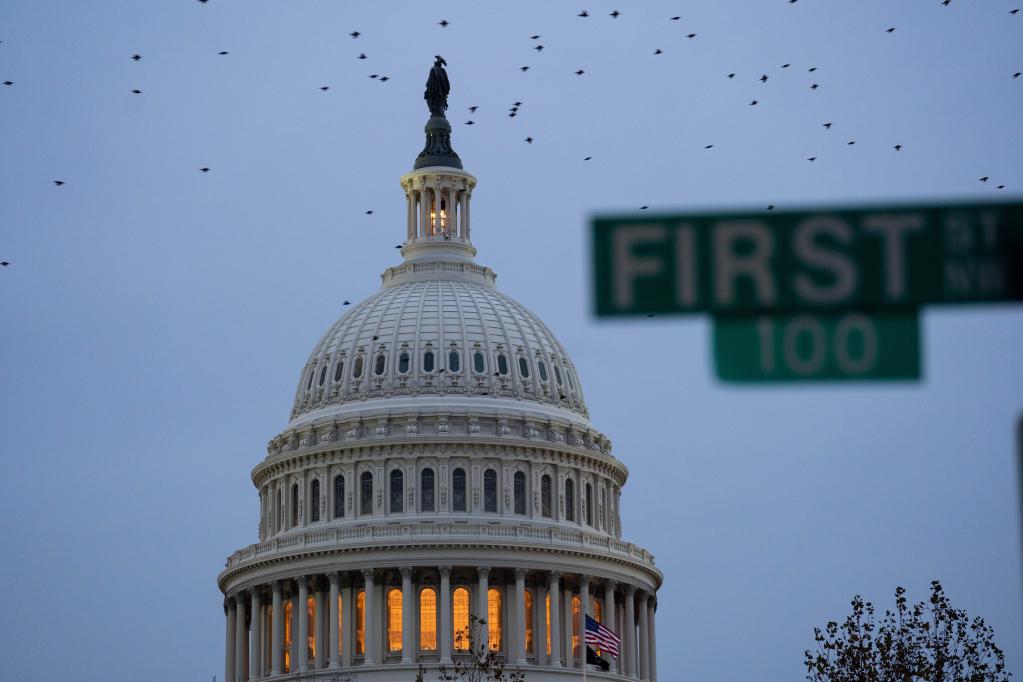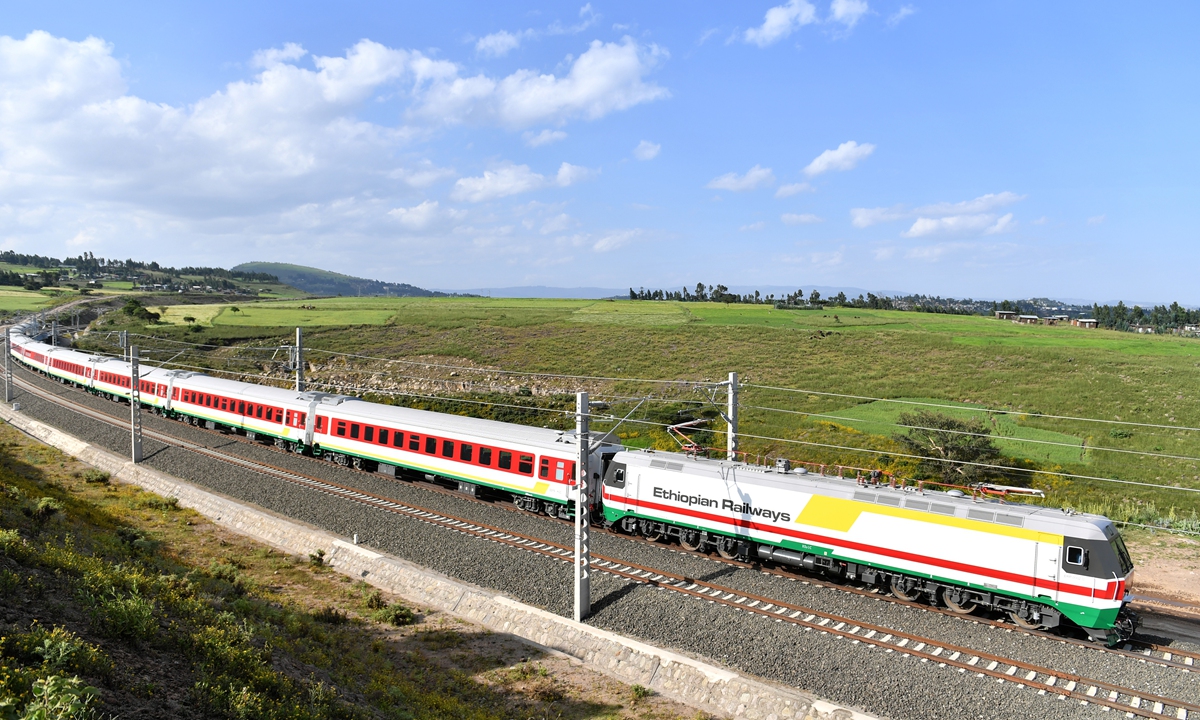Stop, Look and Listen

Supporting Africa’s development is the common responsibility of the international community, and African countries have the wisdom and capability to choose cooperation partners that can help advance African interests.
American President Joe Biden’s latest slip of the tongue was a most unfortunate one. In his speech at the U.S.-Africa Business Forum on December 14, a key part of the long-overdue Second U.S.-Africa Leaders Summit (December 13-15), Biden announced he would “work with Congress to invest $350 billion to facilitate more than almost half a billion dollars in financing to make sure more people across Africa can participate in the digital economy.”
This figure far exceeded the $55 billion in aid to Africa the United States had promised to send over the next three years on the first day of the summit. The official transcript of the president’s remarks was later posted on the White House website, where $350 billion became $350 million, with the sum announced by Biden marked with a strikethrough.
From “billion” to “million,” this 1000-fold shrinkage seems to be an accidental inaccuracy, but in it lies the irony of the U.S. promising to aid developing countries in recent years. Since taking office in early 2021, the Biden administration has put forward the Build Back Better World program and the Partnership for Global Infrastructure and Investment. These two ambitious global initiatives, however, pretty much remain on the drawing board as of now. In sum, old promises have not yet been fulfilled, and this new $55 billion in aid to Africa still looks like a check African nations can never cash.
But the bigger question is whether the U.S. is willing to stop, look and listen and consider the real demands of African countries.
The eight-year itch
More than eight years after the First U.S.-Africa Leaders Summit in August 2014, Biden invited 49 delegations from African countries and the African Union to participate in the event, which was also the largest international conference to take place in the U.S. since the outbreak of COVID-19 in early 2020.
With a packed three-day schedule, the agenda covered economic cooperation, regional peace, food security and the climate crisis. Yet many critics complained about the lack of face-to-face meetings between the U.S. president and leaders of African countries and that these countries were not given sufficient space to express their views.

In the leadup to the summit, Carlos Lopez, former Executive Secretary of the United Nations Economic Commission for Africa and a visiting professor at the Nelson Mandela School of Public Governance at the University of Cape Town in South Africa, stated the conference topics had been predetermined by Washington and not through consultation. “This one is a geopolitical exercise, it’s a photo-op. I think the summit is going to have a lot of these promises, but it’s not going to change anything structurally,” Lopez was quoted as saying in a news report by London-based magazine African Business on November 25.
A summit does not seem likely to bridge the trust deficit between the U.S. and Africa. Africa has never been a priority in American foreign policy. Its strategy toward the area has always been based on the competition of non-African powers, seeking a balance of influence with its rivals on the continent. That is why the U.S. drastically reduced its level of aid to African countries after the end of the Cold War. It was expected Barack Obama, the first African American president, would significantly elevate U.S.-Africa cooperation during his tenure. Nevertheless, Obama did not make Africa a priority until his second term—when he organized the First U.S.-Africa Leaders Summit on the heels of his trip to the continent a year earlier.
His successor Donald Trump was the first U.S. president in decades not to officially visit any African countries. And the continent never emerged as one of Trump’s foreign policy priorities. Not only the political, but the economic connection between the two sides, too, has since declined. According to the U.S. Department of Commerce, U.S. exports of goods to Africa hit $26.7 billion in 2021, down 30 percent from $38.1 billion in 2014; two-way trade went down from 2008’s record $141.9 billion to last year’s $64.3 billion.
For the Biden administration, convening the Second U.S.-Africa Leaders Summit was in itself a sign of healing. But a show of excessive strength harbors the danger of having the opposite effect. In an interview with Al Jazeera reporter Steve Clemons on December 15, Dr. Arikana Chihombori Quao, former African Union envoy to the U.S., explained how U.S. officials regard Africans as people who “need help” or “need to be told what to do,” and this is ruining relations between Africa and Washington. “The U.S. needs to call for a timeout and treat Africans with respect,” she added.
Africa first
“Africa appears to be the potential bride being courted by suitors from across the world,” Anne Soy, BBC’s senior Africa correspondent, wrote on December 16. “Each is keen to sweeten the deal, but there seems to be an acceptance that these days, insisting on an exclusive relationship with African countries may no longer be tenable.”
Whereas this statement is debatable, one reality that cannot be ignored is that in the past eight years, most African countries have achieved a GDP growth of 4 to 6 percent.

If Africa sustains and accelerates structural reforms, some economists believe the continent can emulate China’s rapid rise over recent decades.
According to a 2020 forecast from The Economist, the young population in Africa will double to 2.5 billion by 2050, accounting for more than a quarter of the world’s population, and the continent’s business and consumer market will reach $16 trillion.
This economic potential will also greatly enhance the international status of African countries. Africa should have a bigger say in dealing with international affairs. This is the voice of the international community.
“Representatives from the continent should put the needs and interests of Africa at the front. This should be the unifying strategy for engaging with Washington and any other regional economic powerhouse reaching out to Africa for help,” an op-ed in Kenya’s mainstream newspaper The Standard read on December 14.
This is also China’s philosophy of advancing its relations with African countries. Just as Chinese Foreign Ministry spokesperson Wang Wenbin said at a press conference on December 13, supporting Africa’s development is the common responsibility of the international community, and African countries have the wisdom and capability to choose cooperation partners that can help advance African interests.
“We hope that the international community will address the real needs of African countries by taking concrete actions and deliver for the continent’s socioeconomic development and the welfare of its people,” Wang concluded.
 Facebook
Facebook
 Twitter
Twitter
 Linkedin
Linkedin
 Google +
Google +










